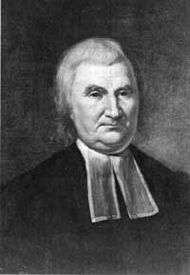Difference between revisions of "John Witherspoon"
m (Template) |
DavidB4-bot (Talk | contribs) (clean up) |
||
| Line 5: | Line 5: | ||
|Founding Documents:=[[Declaration of Independence]], <br>[[Articles of Confederation]] | |Founding Documents:=[[Declaration of Independence]], <br>[[Articles of Confederation]] | ||
}} | }} | ||
| − | '''John Witherspoon''' (February 5 1723 – November 15 1794) was a minister, college president, and member of the [[Continental Congress]]. | + | '''John Witherspoon''' (February 5, 1723 – November 15, 1794) was a minister, college president, and member of the [[Continental Congress]]. |
| − | ==Early | + | ==Early life== |
Witherspoon was born in Gifford, East Lothian, [[Scotland]] in February 1722. At the age of fourteen he attended the University of Edinburgh, and when he was twenty-one he followed in his father's footsteps and became a [[Church of Scotland]] minister. | Witherspoon was born in Gifford, East Lothian, [[Scotland]] in February 1722. At the age of fourteen he attended the University of Edinburgh, and when he was twenty-one he followed in his father's footsteps and became a [[Church of Scotland]] minister. | ||
| Line 20: | Line 20: | ||
He was a strong advocate of the [[Declaration of Independence]] and grew impatient as congress members debated the merits of the document. Witherspoon voted affirmative for independence on July 2, 1776. Five months later the British burned his library to the ground. | He was a strong advocate of the [[Declaration of Independence]] and grew impatient as congress members debated the merits of the document. Witherspoon voted affirmative for independence on July 2, 1776. Five months later the British burned his library to the ground. | ||
| − | ==Later | + | ==Later life== |
In 1779, after more then six years and service in more than one hundred committees, Witherspoon voluntarily retired from his seat in the Continental Congress. He was persuaded to return to Congress in 1780, but at the close of 1782, he again retired from political life. | In 1779, after more then six years and service in more than one hundred committees, Witherspoon voluntarily retired from his seat in the Continental Congress. He was persuaded to return to Congress in 1780, but at the close of 1782, he again retired from political life. | ||
| − | ==See | + | ==See also== |
* [[William Houston]] | * [[William Houston]] | ||
| Line 29: | Line 29: | ||
<references/> | <references/> | ||
| − | {{ | + | {{Declaration of Independence}} |
| − | {{DEFAULTSORT: Witherspoon, John}} | + | {{DEFAULTSORT:Witherspoon, John}} |
| − | [[Category: Founding Fathers]] | + | [[Category:Founding Fathers]] |
[[Category:Religion and Politics]] | [[Category:Religion and Politics]] | ||
[[Category:Presbyterians]] | [[Category:Presbyterians]] | ||
Revision as of 03:43, June 27, 2016
| Founding Fathers | |
|---|---|

| |
| John Witherspoon | |
| State | New Jersey |
| Religion | Christian- Presbyterian [1] |
| Founding Documents | Declaration of Independence, Articles of Confederation |
John Witherspoon (February 5, 1723 – November 15, 1794) was a minister, college president, and member of the Continental Congress.
Early life
Witherspoon was born in Gifford, East Lothian, Scotland in February 1722. At the age of fourteen he attended the University of Edinburgh, and when he was twenty-one he followed in his father's footsteps and became a Church of Scotland minister.
Career
Witherspoon wrote an acclaimed theological series while installed as pastor, first at Beith, Ayrshire, and then as minister of the Laigh Kirk ("Low Church") in Paisley. In 1766, he declined his election to the presidency of the College of New Jersey (now University) in the American Colonies because his wife, Elizabeth Montgomery, was reluctant to leave Scotland. However, due to the influence of friends, the family decided to move to the Colonies to accept the job offer in August 1768.[2]
He was inaugurated to the position of president of Princeton Collage in 1774, and contributed a significant amount of books to the university's library. One of Witherspoon's greatest contributions during his tenure as president was his endeavor to unite the Presbyterian Church in America.
Continental Congress
His involvement in politics began during his time serving as president of Princeton, where he wrote numerous articles criticizing British rule in America. On June 22, 1776, after taking part as a member of the Provincial congress in the overthrow of the authority of the royal governor, William Franklin, Witherspoon was elected to represent New Jersey in the Continental congress.[3]
He was a strong advocate of the Declaration of Independence and grew impatient as congress members debated the merits of the document. Witherspoon voted affirmative for independence on July 2, 1776. Five months later the British burned his library to the ground.
Later life
In 1779, after more then six years and service in more than one hundred committees, Witherspoon voluntarily retired from his seat in the Continental Congress. He was persuaded to return to Congress in 1780, but at the close of 1782, he again retired from political life.
See also
References
- ↑ http://www.adherents.com/gov/Founding_Fathers_Religion.html
- ↑ http://etcweb.princeton.edu/CampusWWW/Companion/witherspoon_john.html
- ↑ http://www.ushistory.org/declaration/signers/witherspoon.htm
| ||||||||||||||||||||||||||||||||||||||||||||||||||
